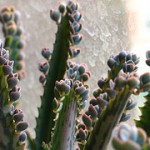Poisonous House Plants For Babies Safety Tips
 People buy plants that appeal to their aesthetic sense because of color or form of leaves or beautiful flowers. They do not even ask the name of the plant they are buying so it is obvious that they would not know about the danger it may pose for their little ones.
People buy plants that appeal to their aesthetic sense because of color or form of leaves or beautiful flowers. They do not even ask the name of the plant they are buying so it is obvious that they would not know about the danger it may pose for their little ones.
Whatever babies lay their hands on, finds its way to their mouth. If the foliage or stems are poisonous, serious problems could arise. The poison may manifest itself immediately or it may take a few hours.
The first symptoms could be vomiting and diarrhoea accompanied by stomach cramps. If a large portion of the plant is eaten, these symptoms may be severe and require immediate medical attention. Sometimes parents may not be aware of what is causing this condition and may delay contacting the doctor.
Many other plants cause milder reaction like rashes. Stronger reactions can be experienced like swelling of throat and tongue, impairing breathing, talking and swallowing. Still others cause flu-like symptoms, which are difficult to identify as allergic reaction to house plants.
Pollen of some plants causes breathing problem for asthmatic children and can also cause an allergic reaction. Dust collected on the plants can cause stomach problems too.
It is better to be safe than sorry so the best option would be not to keep any plants indoor. If you have verified the safety, even then keep it on a high ledge or a table out of the reach of the children. Do not keep any seeds, seedlings or bulbs intended to be planted in the garden inside the house. These may tempt curious children to taste them.
Some common plants which are not safe are some species of lilies and ferns. Holly and mistletoe, used for decorating homes during Christmas, are poisonous for children. Ivy, trained on walls, and hydrangea, a flowering shrub used for hedges, are also poisonous.
Whenever you buy plants find out their names, ask the attendant at the nursery about them or research on the internet or library. Ask a knowledgeable gardener. Buy them only when you are sure that they are safe for your children.
Contact the child’s doctor if there is any unexplained or sudden onset of symptoms. If you feel that the child has eaten some poisonous plant, immediately contact a poison control centre. Give them all information as to the name of the plant, and the amount ingested. They will be able to give guidance about the treatment.